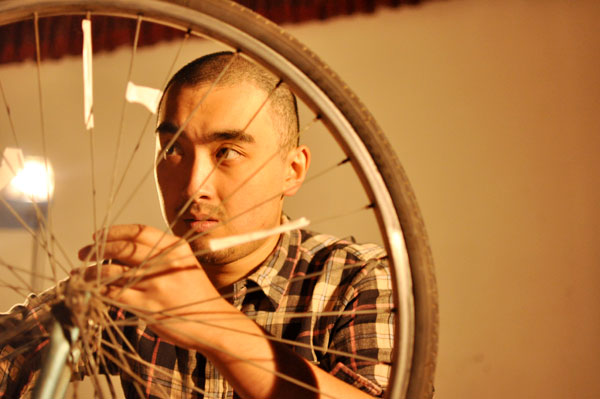 |
|
Actor Li Jialong plays the protagonist, who leads a difficult life [Photo provided to China Daily] |
Diehard fans of Norwegian master playwright Henrik Johan Ibsen must not miss avant-garde theater director Wang Chong's latest production, Ibsen in One Take, in Beijing.
It's about the last hours of a common Chinese man, who thinks about his whole life before he dies. The play has integrated representative characters, themes and classical lines from Ibsen's works.
"It's a quick introduction to Ibsen. Even if one has never read his works, one can easily understand the play," says Norwegian playwright Oda Fiskum, who wrote the English script. She has lived in Beijing for more than six years.
Fiskum says Ibsen's works focus on the complicated inner world of human beings, because the psychological conflicts of the characters is a primary theme throughout his plays. So, she emphasizes such themes in the play and tries to present the essence of Ibsen's dramatic works.
"It's not a very positive play. The protagonist leads a difficult life. The questions he encounters might also be faced by other young people, such as their relationship with their parents, professional life and relationship to women," she says.
It's the first time that Fiskum has written an English script for a Chinese theater director's works. The play is performed in Chinese after translation. She has also written some Chinese scripts.
"It's a very interesting cooperation. Such cooperation between home and abroad is rare in China, due to barriers of language and cultures. I can communicate with her very well because we're both bilingual. It's more efficient," Wang says.
"Wang works in an intuitive way, and he doesn't follow any rule or recipe. He's not afraid to change stuff, or express his own ideas. That's quite unusual, and that's what makes him distinguished," Fiskum says.
"To write the play is like playing a jigsaw. I picked a lot of lines, characters and elements of various plays by Ibsen and integrated them into the new script. None of them are direct quotes, but they are still recognizable, as people are familiar with the lines."
Another distinction of the play is that it's a live movie, and everything is in one take. The audiences only have to watch a big projector in front of them, while a cameraman captures all the performers' moves on the other side of the stage.
Wang has adopted such multimedia in his works several times.

"We use only one take to show one life of a person and the essence of Ibsen. It's a new understanding of movie shooting and theater," he says.
Fiskum says she talked to many Chinese young people, including Wang, 30, so that the script will be as truthful as possible to the young people.
"It's difficult to decide the title of the play, and Wang and I have changed the name nine times. We had to come up with the new title in the end, which squeezes all we want to express into it," she says.
"In China, theater is very new, and is yet to find its form, while in Europe, it's more established. What I write is not for Chinese or for Europeans only. I want it to be equally relevant to both," she says. "I hope the play will make people think about their parents, families, lovers and life."
|
|
|
|
|
|
|
|
